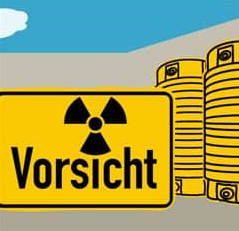Aktuelle Infos zu Kernkraft und Atommüll-Endlagersuche
TAXONOMY AND NUCLEAR ENERGY - Critical Review of the Joint Research Centre’s Assessment for the EU Taxonomy Regulation
7.7.2021

Das EU-weite Klassifikationssystem, die sogenannte "Taxonomie", stuft wirtschaftliche Tätigkeiten anhand ihrer ökologischen Nachhaltigkeit ein. In diesem Rahmen wird die Frage, ob eine Investition in Atomkraft als nachhaltig einzustufen ist, nach wie vor heftig diskutiert. Zur Klärung dieser Frage hat die Kommission im Sommer 2020 das Joint Research Centre beauftragt, einen Bericht zu verfassen. Dieser erlangte im März 2021 das Licht der Öffentlichkeit, interessanterweise ohne Nennung von AutorInnen.
Die erste umfassende kritische Analyse dazu wurde vom Österreichischen Ökologie-Institut ausgearbeitet und am 15. Juni 2021 in einer internationalen Pressekonferenz präsentiert. Dadurch wird eine informierte Debatte ermöglicht.
Lead author Gabriele Mraz sums up her evaluation of the JRC paper: “We call upon the European Commission and both Euratom Art. 31 Group and SCHEER Committees which are tasked with evaluating the JRC Report by taking an evidence-based approach. The JRC assessment provides an
insufficient basis for decision-taking. Our Critical Review highlights the consequences of nuclear energy use that the report ignored and should be considered. It is not acceptable to simply leave out facts about nuclear energy that do not support the desired narrative.” The facts that should be taken
into account include:
- Severe accidents with catastrophic and long-term consequences have been downplayed by the JRC: the risk of chronic illness due to a severe accident, the risk of loss of agricultural areas due to severe contamination, and the disastrous social and economic impacts on people forced to live in contaminated territories. The JRC failed to include either of the major accidents – Chernobyl and Fukushima – in its comparison of fatality rates.
- After decades of research, there is still no final disposal for nuclear waste. The Swedish copper canister solution, which Finland also intends to use at its planned Onkalo disposal, has not yet been approved because copper appears to corrode under the expected underground conditions. There is currently no solution for the safe disposal of tons of high level nuclear waste and spent fuel.
- JRC failed to discuss non-proliferation problems; the risk of more countries acquiring nuclear weapons via civil nuclear programs has been entirely omitted.
- JRC appears to believe that regulations alone will ensure nuclear safety, and that the achievable safety improvements identified during the EU stress tests have been implemented. The claim that the new Generation III+ reactors will guarantee safety are also incorrect; the only one (EPR) currently in operation is Taishan in China. Instead, the existing fleet of reactors will continue to operate beyond their planned lifespans, with outdated designs and increased risk associated with aging components.
- Nuclear energy significantly harms human health, even in the low dose range resulting from normal NPP operations and nuclear workplaces.
- The JRC Report systematically downplays the risks and hazards specific to nuclear energy, omitting to mention many potential areas of danger. The residual risk of a severe accident at any plant, at any time, is ignored, although mankind has already experienced the outcomes of such events more than once. This is not only a serious omission, but also a clear failure to fulfil the task the JRC was set.
Weitere Informationen in englischer Sprache finden Sie auf der Website Don't nuke the taxonomy.
☰
×




